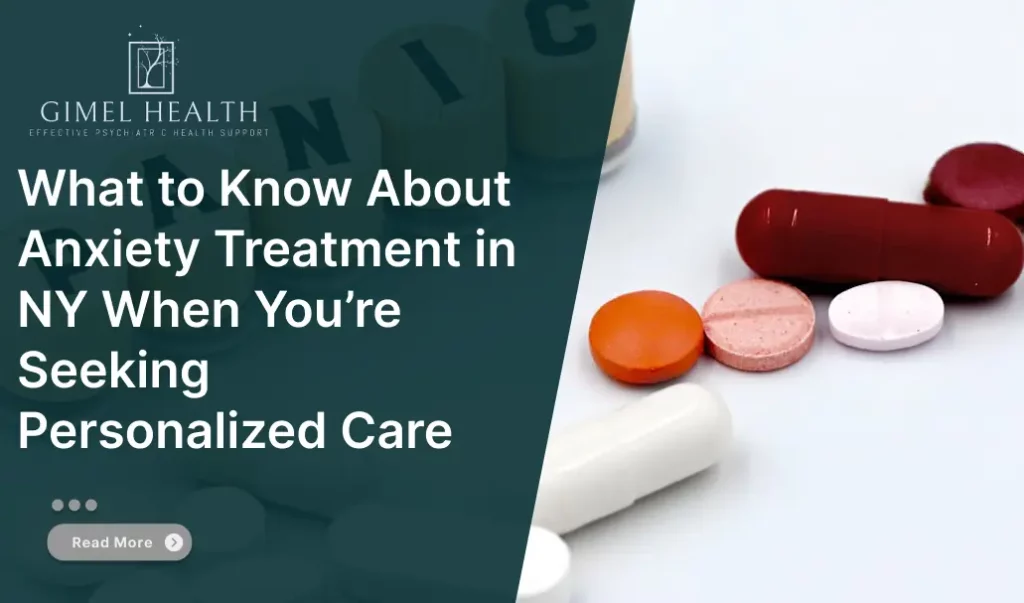
Anxiety is one of the most common mental...Read More

No two people experience ADHD and bipolar disorder the same way, which is why each treatment plan I create is fully personalized. I consider the individual’s mental health condition, symptom severity, lifestyle, and even their daily stressors before recommending any interventions. When ADHD and bipolar disorder occur together, treatment becomes more nuanced. This combination, often referred to as comorbid ADHD and bipolar NJ disorder, requires a careful and informed approach to avoid worsening symptoms or triggering new episodes.
Beyond medication, therapy is an essential part of long-term care. I often recommend Cognitive Behavioral Therapy, psychoeducation, and practical skill-building to support emotional regulation. At the same time, I carefully monitor for mixed episodes, substance abuse, or conduct disorder, all of which can interfere with recovery. The goal is to create a treatment plan that is both effective and sustainable.
Attention-deficit/hyperactivity disorder (ADHD) and bipolar disorder are two distinct yet frequently overlapping mental health conditions. When both occur together, as in comorbid ADHD and bipolar disorder, which requires a more thorough and personalized approach. Shared or overlapping symptoms like impulsivity, emotional outbursts, and emotional dysregulation can look similar to manic episodes or mood fluctuations seen in bipolar disorder.
To make an accurate diagnosis, I use structured diagnostic criteria, clinical interviews, and tools from the Statistical Manual of Mental Disorders. I also screen for other psychiatric disorders, such as anxiety disorders, personality disorders, or substance use disorders, to ensure a complete evaluation.
Although some patients show signs of ADHD in childhood, clearer symptom patterns often emerge in adolescence or early adulthood. My evaluation includes a full review of ADHD symptoms, manic symptoms, depressive episodes, sleep problems, and family history.
To distinguish ADHD and bipolar NJ, I assess executive function, age of onset, past suicide attempts, and patterns of mood episodes. I also reference data from longitudinal studies, systematic reviews, and research from the National Institute of Mental Health to ensure an accurate diagnosis.
One of the most nicest, kindest and considerate doctors I met.
He went over with me thoroughly on the documents and was generous enough to explain me everything that I asked.
I think he is a real doctor of people and not just someone that’s write prescriptions.
I wanted to sincerely thank Dr Feldman for his help during my time in the U.S.
His support, especially when my country was under attack, flights were grounded and medication was hard to access, made a real difference.
He was very kind, professional, and helped me get exactly what I needed in the best and most thoughtful way.
Michael Feldman is an exceptional mental health provider who truly listens and takes time to understand patients’ concerns. He provides thoughtful guidance and support.
I met Michael Feldman after years of search and trial and error. If you look for a professional who is invested in his patient’s progress, research-oriented, with a deep understanding of the body-mind connection and a wholistic approach to treatment, look no further.
Dr Michael Feldman is an amazing doctor. He prescribed the proper medication in the right dosage for me. He did this because he listens and asks very good questions. I highly recommend him and his practice at Gimle Health.
Michael Feldman is a wonderful and caring P.A. He always gives 100%. He listens attentively and provides many insights I would never thought of by myself . I find having him in my corner invaluable and I could not recommend him more highly. He’s the best!
Michael is an amazing professional! He truly invests in his patients and provides care and feedback even during off hours. Although we have only been using his services for a short time, he already stands out as caring, knowledgeable, and confident in his approach. We plan to continue using his services and would absolutely recommend him to anyone!
Your journey to better mental health starts here. With advanced expertise in biology and psychiatry, I build exclusive medication plans backed by science. Contact me to schedule your initial consultation.
(201) 815-4351
440 West Str, Ste 307, Fort Lee Bergen County NJ 07024
Anxiety is one of the most common mental...Read More
Finding the right psychiatrist NJ is one of...Read More
Anger is a normal emotion, but when it...Read More
Premenstrual Dysphoric Disorder is a severe form of...Read More
Many mental health providers see patients who show...Read More
Medication management is one of the most effective...Read More
The latest research shows that individuals with ADHD and bipolar NJ have a significantly higher risk of functional impairment, especially if the diagnosis is delayed. Studies published in the Journal of Affective Disorders and other peer-reviewed sources point to shared genetic factors, early age of onset, and high levels of emotional dysregulation as common threads in dual-diagnosis patients.
In fact, longitudinal studies reveal that untreated comorbid ADHD may contribute to more severe mood fluctuations, medication resistance, and even increased suicide attempts. This is why I use current data and tools from the National Institute of Mental Health to guide every diagnostic process and bipolar disorder treatment plan.
The use of stimulant medication in people with comorbid ADHD and bipolar disorder requires special care. While stimulants like methylphenidate can help with executive function and reduce ADHD symptoms, they may also trigger manic symptoms or worsen mood episodes if mood stabilizers are not established first.
To ensure an effective treatment, I begin by stabilizing mood using medications such as lithium or valproate. Only after mood is balanced do I consider introducing stimulant treatment, which is then closely monitored. This approach helps prevent complications like mixed episodes and protects against worsening of symptoms in vulnerable patients.
Yes. ADHD is a neurodevelopmental condition, while Bipolar II is part of the spectrum of mood disorders. Both can involve impulsivity, emotional reactivity, and attention issues, but their symptom patterns and causes are different. Bipolar II includes cycles of hypomanic episodes and depressive symptoms, which occur episodically, while ADHD symptoms are more persistent and often present in childhood. Other mood disorders, like cyclothymic disorder, also share overlapping features but follow different diagnostic timelines and intensity levels.
Making a differential diagnosis can be challenging when similar symptoms appear. I examine mood states, behavioral history, and diagnostic criteria to determine if a patient is experiencing ADHD and bipolar NJ, or both. An accurate diagnosis leads to more effective and safer care for ADHD patients suffering from mental illness.
Emotional dysregulation is a hallmark of both conditions. People with ADHD and bipolar, often report having a hard time managing stress, mood, and frustration. These difficulties may show up as irritable mood, anger, or emotional outbursts. For those with ADHD comorbidity, these reactions can happen frequently and without clear triggers.
One reason is that both disorders can affect executive function and impulse control. Another factor is sleep deprivation, which is known to worsen both bipolar symptoms and ADHD symptoms. Addressing these areas with Cognitive Behavioral Therapy, medication, and consistent routines can lead to meaningful progress and better long-term outcomes.
Lifestyle modifications can enhance medical care for individuals with ADHD and bipolar NJ. Managing sleep problems, practicing stress reduction, and following a structured daily routine help reduce the intensity of mood symptoms and improve attention and focus. For those in the adult population, maintaining healthy habits can make medications more effective and reduce the need for frequent dosage changes.
Patients who experience depressive states, impulsive symptoms, or difficulty concentrating often benefit from regular physical activity and improved sleep hygiene. These changes are especially important in reducing the impact of stimulant medications and preventing substance abuse, which is more common in dual-diagnosis patients.
ADHD is a neurodevelopmental disorder characterized by inattention, hyperactivity, and impulsive behavior. Bipolar disorder is a mood disorder marked by episodes of depression, mania, or hypomanic episodes. ADHD symptoms are more consistent over time, while bipolar symptoms occur in mood episodes. Proper differential diagnosis is essential to distinguish between these similar symptoms.
A recent study published in the Journal of Affective Disorders confirms high comorbidity rates between ADHD and bipolar disorder, especially in adolescent and adult populations. Research from clinicians like Schiweck C highlights how often these conditions appear together, complicating diagnosis and treatment. The comorbidity of bipolar disorder and ADHD, often referred to as comorbid BD in clinical research, affects long-term outcomes, making early intervention and accurate assessment essential.
In the United States, the prevalence of ADHD continues to rise, particularly among young adults and adult bipolar disorder patients. Many cases begin as early-onset ADHD but go undiagnosed until symptoms worsen in adulthood. Studies have shown higher rates of comorbid conditions, especially mood disorders, in these populations. This delay often results in increased risk for emotional instability, academic or occupational difficulties, and mood fluctuations. Mental health professionals play a crucial role in identifying these patterns early and developing an effective treatment plan.
Early diagnosis is critical in adolescent psychiatry, especially when symptoms of ADHD or bipolar disorder first appear. Teenagers may display signs like mood dysregulation, oppositional defiant disorder, or impulsivity, which are often misinterpreted. Without proper screening from experienced healthcare providers or a Department of Psychiatry, these early signs may progress into more severe mental health disorders. Timely intervention leads to more accurate care and better long-term outcomes.
Symptoms of bipolar disorder often overlap with other psychiatric and personality disorders, such as borderline personality disorder, major depressive disorder, or psychotic symptoms. For example, loss of interest, mood instability, and emotional reactivity can appear in several different conditions. That’s why I rely on structured diagnostic tools and a full clinical evaluation to distinguish between similar symptom profiles. Accurate diagnosis helps prevent mislabeling and ensures each patient receives targeted care.
Yes. Individuals with a family history of ADHD, mood disorders, or both may face a higher risk of developing bipolar disorder. High energy levels, difficulty sleeping, and impulsive behaviors are often early indicators. When these signs are overlooked or misunderstood, the result can be delayed diagnosis and more severe symptoms over time. I work with each patient to assess genetic factors, mood patterns, and executive function issues to provide early and proactive support.
ADHD overlap can make it harder to identify mood disorders like bipolar disorder. Both conditions share symptoms such as impulsivity, restlessness, and emotional outbursts. Without careful evaluation, the risk of BD being misdiagnosed or missed entirely increases.
A correct diagnosis of BD is especially important when patients report intense mood shifts or feelings of worthlessness, which may indicate underlying depressive episodes rather than attention issues alone. I assess mood history, behavioral triggers, and symptom progression to ensure each patient receives the right diagnosis and treatment.
We use cookies to improve your experience on our site. By using our site, you consent to cookies.
Manage your cookie preferences below:
Essential cookies enable basic functions and are necessary for the proper function of the website.
These cookies are needed for adding comments on this website.
Google reCAPTCHA helps protect websites from spam and abuse by verifying user interactions through challenges.
Google Tag Manager simplifies the management of marketing tags on your website without code changes.
Statistics cookies collect information anonymously. This information helps us understand how visitors use our website.
Vimeo is a video hosting platform for high-quality content, ideal for creators and businesses to showcase their work.
Service URL: vimeo.com (opens in a new window)
You can find more information in our Cookie Policy and Privacy Policy.